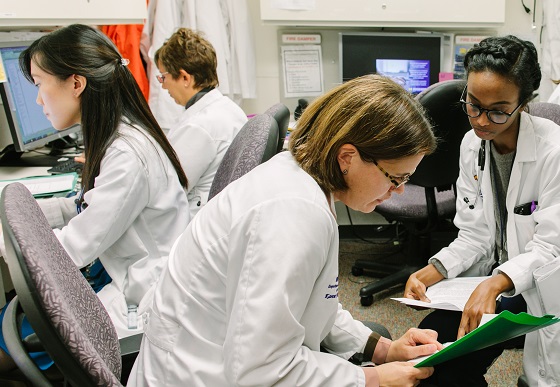Taubman Institute Innovation Projects: Understanding patient differences
Why does disease develop and progress differently from person to person, and how can doctors adjust treatments accordingly?
A new Taubman Institute grant program aims to help answer such questions by funding projects that will gather data and samples from U-M patients and, eventually, translate that knowledge into different approaches to patient care.
The grants will pay for collecting, storing and analyzing information — lots of it — from patients at U-M treatment centers (and beyond, if necessary). The data will be of different types, from biological samples to behavior to data obtained from remote devices such as cell phones.
“We want to make everybody who walks into one of our clinics a research subject, one way or the other,” said Taubman Institute Director Charles Burant, MD, PhD. “We’re trying to get science closer to the patient.”
Dubbed the Taubman Institute Innovation Projects (TIIP), the program kicked off in February with two informational town hall meetings that drew more than 100 researchers from around U-M.
The TIIP program is based on the notion that much of current medical treatment for an individual is determined by reviewing a limited amount of information that is specific to the disease that is being treated. While all this information is important, TIIPs researchers will seek a broader set of data, including molecular and genetic data, and systematically assess it to help explain why some people experience better outcomes than others. Researchers hope that these discoveries will lead to more personalized and cost-effective treatments.
Prospective grantees are being encouraged to think big and plan multi-disciplinary collaborations involving teams from across U-M, from experts in fields like biomedical engineering and information technology to nurses and doctors in the clinic. Applications will be judged primarily on the impact that they can make on patient care and the advancement of understanding of health and disease.
“I’m open to unconventional ideas — and we’ll help make them work,” Burant told researchers. “Tell us what you need, and we will figure out how to get it done.”
The institute expects to fund one or two TIIP projects in 2018, with four to six more under way within the next two years.
As much as $3 million per year of Taubman Institute monies may be available for TIIP grants, and applicants are asked to present a long-term funding plan that taps other departments or even industry for sustaining funds.
Burant believes that health insurers, with their vested interest in reducing health care costs, will help, too. “If we can show them that personalizing treatment saves money, it is near certain that they will pay for the testing or intervention”.
Right now the grants program will focus on projects in ambulatory medical clinics. If the impact of the programs need patients from outside of the Michigan Medicine clinics, Burant will work with the TIIP teams to identify and recruit patient populations at other medical centers locally or nationally.
“We really want to make a difference in how we take care of people,” he said.






